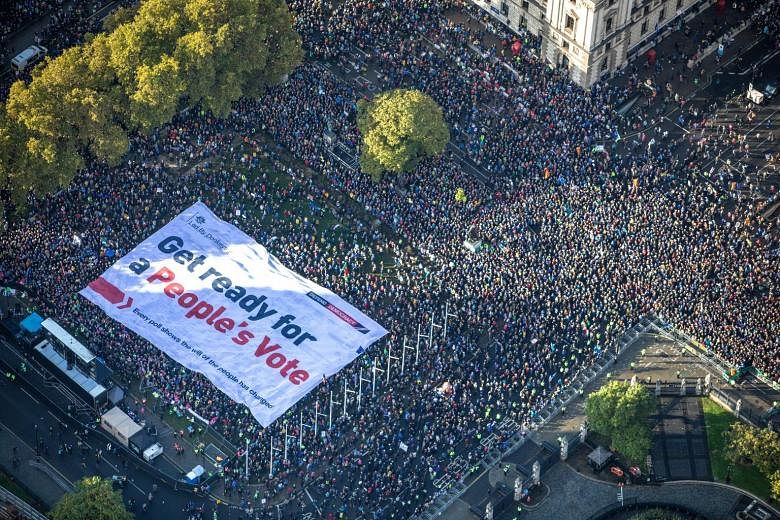BRUSSELS/LONDON • The European Union (EU) will play for time rather than rush to decide on British Prime Minister Boris Johnson's reluctant request to delay Brexit again, diplomats with the bloc said after a 15-minute meeting yesterday.
The fractious British Parliament refused to vote on Mr Johnson's new Brexit withdrawal deal on Saturday, a move that forced him to seek a third postponement of Britain's departure from the bloc. It has so far been envisaged for Oct 31.
At a rare Sunday meeting of ambassadors of the 27 states that will make up the EU after Brexit, the diplomats decided to forward Mr Johnson's deal to the European Parliament for its required approval. The EU chamber sits in Strasbourg this week.
"We're looking for more clarity towards the end of the week, hoping that by that time we will also see how things develop in London," one senior EU diplomat said. Another one added that the meeting was very brief: "No questions, no discussion. We are waiting."
French President Emmanuel Macron told Mr Johnson that Paris needed swift clarification on the situation after Saturday's vote, an official said. "He (Mr Macron) signalled a delay would be in no one's interest," the official said.
European Council president Donald Tusk said on Saturday he had received the extension request and he would consult with EU capitals on how to react. While weary of the tortuous Brexit process, EU leaders are keen to avoid a disorderly no-deal Brexit and are unlikely to reject the request. They hope the deal can be approved in London.
After the British Parliament refused to endorse Mr Johnson's deal at the first time of asking on Saturday, the Prime Minister sent an unsigned letter to the European Union requesting a delay to Britain's exit from the bloc but added another note in which he explained that he did not want a "deeply corrosive" Brexit extension.
He had previously said he would rather be "dead in a ditch" than ask for an extension. But he was compelled by a law passed last month to send a letter to the bloc asking to push back the deadline to Jan 31 after lawmakers thwarted his attempt to pass his EU divorce deal on Saturday.
In an extraordinary step that indicates the extent of the Brexit fever gripping Britain, Mr Johnson sent a total of three letters to Mr Tusk.
First, a brief cover note from Britain's EU envoy explaining that the government was simply complying with that law; second, an unsigned photocopy of the text that the law forced him to write; and a third letter saying that he did not want an extension.
"I have made clear since becoming Prime Minister and made clear to Parliament again today, my view, and the government's position, that a further extension would damage the interests of the UK and our EU partners, and the relationship between us," Mr Johnson said in the third letter, which was signed "Boris Johnson".
Mr Johnson, for whom delivering Brexit is key to his plan to hold an early election, said he was confident that the process of getting the Brexit legislation through Parliament would be completed before Oct 31, according to the letter.
Meanwhile, the British government insisted yesterday the country will leave the EU on Oct 31, despite requesting a Brexit delay.
"We are going to leave by Oct 31. We have the means and the ability to do so," Mr Michael Gove, the minister-in-charge of no-deal Brexit preparations, told Sky News.
"That letter was sent because Parliament required it to be sent... but Parliament can't change the Prime Minister's mind; Parliament can't change the government's policy or determination," Mr Gove said.
The EU, which has grappled with the tortuous Brexit crisis since Britons voted 52 to 48 per cent to leave in a 2016 referendum, was clearly bewildered by the contradictory signals from London.
Mr Gove said the risk of no deal had increased and the government would step up preparations for it, including triggering its "Operation Yellowhammer" contingency plans. "We cannot guarantee that the European Council will grant an extension," he said, adding that he would chair a meeting, scheduled for yesterday, "to ensure that the next stage of our exit preparations, our preparedness for a no deal, is accelerated".
The opposition Labour Party accused the Prime Minister of acting as if he were above the law, and said he could end up in court.
Labour's Brexit spokesman Keir Starmer said: "He is being childlike. The law is very clear he should have signed one letter... If we crash out, because of what he has done with the letters, in 11 days' time without a deal, he bears personal responsibility for that."
REUTERS











